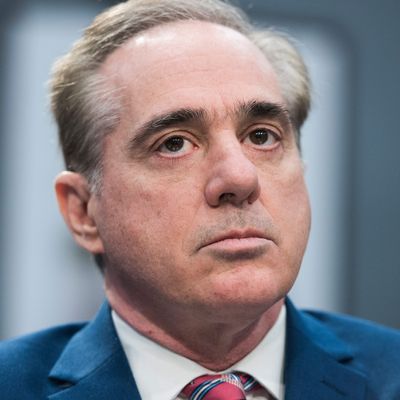
Days after President Trump fired Secretary of State Rex Tillerson via tweet and Chief of Staff John Kelly revealed that he warned him his days were numbered when he was on the toilet, the Washington Post reported that the White House hoped to make its next firing less humiliating:
Some in the White House have been reluctant to oust McMaster from his national security perch until he has a promotion to four-star rank or other comfortable landing spot. They are eager to show that someone can serve in the Trump administration without suffering severe damage to their reputation.
While the next two firings did not involve details like getting “canned on the can,” they were still fairly embarrassing. On March 22, Trump tweeted that John Bolton would replace H.R. McMaster as national security adviser, though his future plans were still in flux. Less than a week later, Veteran Affairs Secretary David Shulkin was ousted in similar fashion.
It seems Trump was not committed to the plan to stop kicking staffers on the way out, but now the problem may go beyond driving away potential hires. Shulkin is disputing the White House’s claim that he resigned, which could complicate Trump’s effort to name Wilkie acting secretary, and possibly spark legal challenges over any actions taken at the department before White House physician Ronny Jackson is confirmed by the Senate.
Shulkin has been publicly battling the Trump administration narrative since the day after he was fired, when he penned a New York Times op-ed. In it he claimed an inspector general report that said he misused taxpayer funds on a European trip was politically motivated, and said he was actually pushed out because he opposes efforts to privatize the VA.
He escalated the dispute in press appearances over the weekend, insisting that he did not leave willingly. “I would not resign, because I’m committed to making sure this job was seen through to the very end,” Shulkin told CNN’s Jake Tapper. “I did not resign.”
Shulkin denied that he submitted a letter of resignation, and said he’d spoken to Trump hours before his tweet and he gave no indication that he was about to be fired. “We talked a lot about issues at VA that were important and how we could continue to make progress on policy issues,” Shulkin said.
When asked for comment, deputy White House press secretary Lindsay Walters repeatedly issued the same statement: “Secretary Shulkin resigned from his position as Secretary of the Department of Veterans Affairs.”
The line between firing and resignation is often unclear, particularly in the Trump White House. But Shulkin claims that rather than privately asking for his resignation, Trump simply tweeted out the name of his replacement. The reason the distinction may matter in this case is that rather than following federal statutes — which would make VA deputy secretary Thomas Bowman acting secretary — Trump wanted to make his own pick. As Politico explained, plans were in the works to install a more privatization-friendly deputy before Shulkin’s firing, but apparently Trump couldn’t wait:
Kelly and other aides wanted Bowman gone before Shulkin left to avoid installing the deputy at the helm, even temporarily. Bowman had pushed back on broad privatization efforts, leading Trump to berate him in an Oval Office meeting for his lack of loyalty.
Trump got around the Bowman problem by naming Robert Wilkie, an undersecretary at the Department of Defense, to the temporary job. A Capitol Hill veteran and member of Trump’s transition team, Wilkie is a former senior adviser to Sen. Thom Tillis (R-N.C.), who supports expanding service members’ access to private doctors.
Under the Federal Vacancies Reform Act of 1998, the president can temporarily fill a vacancy at a federal agency with anyone who has been confirmed by the Senate — if the current office holder “dies, resigns, or is otherwise unable to perform the functions and duties of the office.” The law doesn’t specifically mention firing, which according to some experts, could spark a legal challenge.
Wilkie could wind up serving as the VA’s acting secretary for some time, as it’s unclear how long it will take the Senate to confirm Jackson. Trump has made three nominations requiring Senate confirmation in as many weeks, and some senators aren’t keen on Trump elevating his personal physician, who has no experience in running a department as large as the VA.
If Wilkie was put in place so he could begin making changes at the VA immediately, advocacy groups may take legal action to block those measures, on the grounds that his appointment isn’t allowed under the Vacancies Reform Act. Democrats may also be eager to test the limits of the law, as there’s speculation that it could come into play if Trump fires Attorney General Jeff Sessions. Deputy Attorney General Rod Rosenstein appointed Special Counsel Robert Mueller and Trump complained that he’s a Democrat (though he isn’t), so it seems likely that he would try to block him from becoming acting AG.
“It’s an open question. There are ways to read the statute both ways,” said Stephen Vladeck, a professor at the University of Texas School of Law, told Politico. “There’s reason to wonder if Congress would have wanted to give the president such broad ability to fill a vacancy he creates.”






























